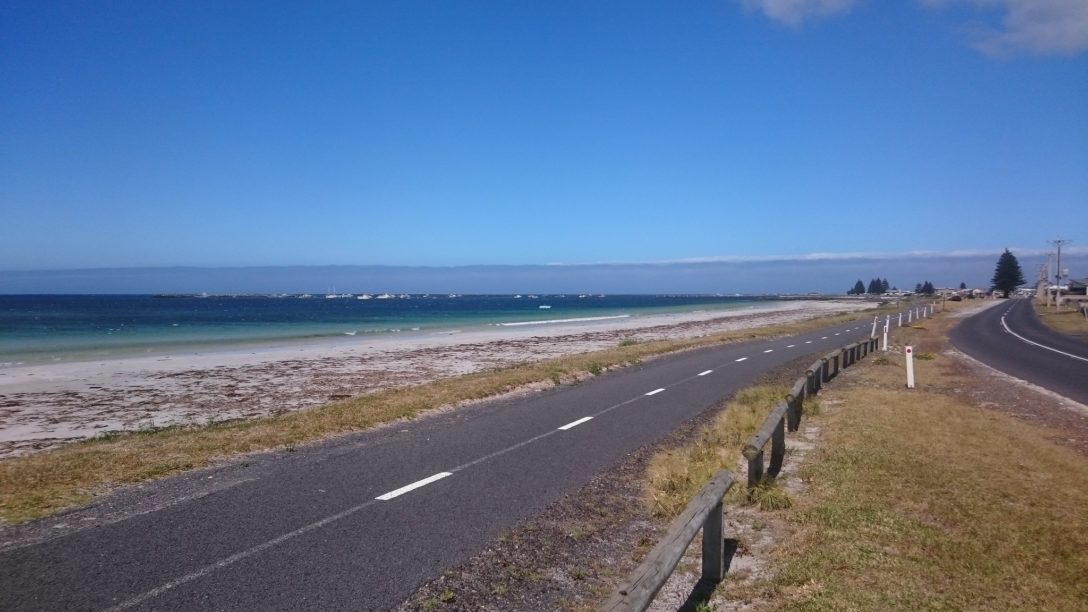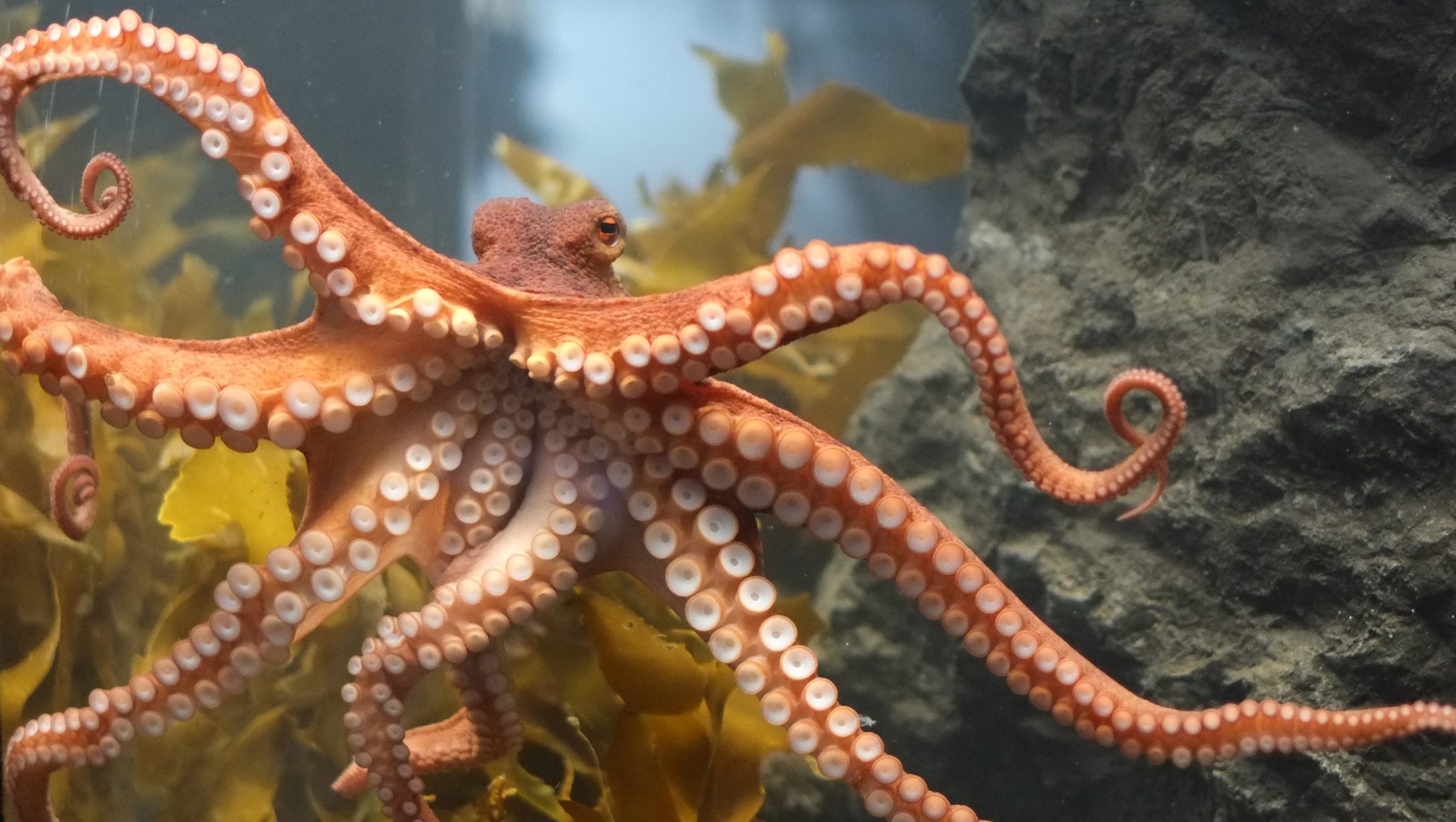Against the cerulean blue of the South Australian sky, an octopus soars, its limbs flailing wildly. The man who has thrown it stands beneath, frozen, looking like a baseball pitcher, his leg just so. The spectators behind him crane their necks in anticipation and something approaching awe. I suspect the man used the tentacles to throw the cephlopod, but I don’t know. You can’t use the head. You can’t shotput an octopus.
It was a curious photo to use on a Facebook post, made by the Bay Escape Festival earlier this year, declaring that its famed “octopus toss” would no longer be taking place.
“IT’S TIME,” the post read. “[W]e are tossing the octopus toss.”
“You have spoken and we have listened,” the post continued. “[We] feel this competition is a tad outdated and [that] it’s no longer appropriate.” It also said that “a plastic ‘puss [won’t] cut it so we’re calling time.”
Octopuses are among the smartest and fastest-evolving creatures on the planet. YouTube videos showing the animals hiding themselves in coconut shells and running, like stallions, across the sea floor have millions of views between them. These videos, and these animals, are terrifying. Forget dolphins, the Simpsons episode in which they come for us, or the moment in Douglas Adams’s Hitchhiker’s Guide in which they leave us, thanking us for all the fish. It’s the octopus that’s really gunning for us. Whole books have been written—Sy Montgomery’s The Soul of an Octopus comes to mind—exploring the nature of the animals’ consciousness and their creepy but undeniable majesty.
Australia’s feelings about seafood in general have grown more complex in recent years, at least as far as the legal system is concerned. In 2017, Nicholas Seafood at the Sydney Fish Markets became the first business in Australia to get done for crustacean cruelty after a member of staff was filmed chopping up a lobster without having previously stunned it. Thanks to the work of academics like Culum Brown at Macquarie University, who provided expert testimony at Nicholas Seafood’s appeal trial, we now know that lobsters feel very real, very acute pain. In his famous essay ‘Consider the Lobster’, David Foster Wallace asked: “Is it all right to boil a sentient creature alive just for our gustatory pleasure?” Switzerland and New Zealand have decided that the answer is no, and have banned the practice outright.
For their part, lobsters play a role in this story, too. Port MacDonnell is home to the country’s largest southern rock lobster fleet, and octopuses remain something of a pest there. It is not uncommon to pull a lobster pot from the ocean and find the exoskeletons sucked empty, down to and including the poo tube. A hale, sated octopus is usually sitting amongst the now-worthless shells. I once saw my brother, who has been a crayfisherman since he was a teenager, behead an uninvited thief out of anger. Not that this did much to deter it. Two thirds of an octopus’s neurons are dispersed through its arms, and these made a break for the side of the boat, climbed it with alien precision, and disappeared themselves into the waves.
I use the word “alien” deliberately here: it is precisely because these animals are so strikingly inhuman that cutting their heads off doesn’t bother us too much, and why we have been happy, until very recently, to lob them skywards in competitions of athletic prowess.
In “Consider the Lobster,” Wallace went on to ask whether even the question of the lobster’s wellbeing might be found “irksomely PC or sentimental.” In Port MacDonnell, the answer was a resounding, even vicious: Yes.

“Wat a load of fucking shit wat people spoke the vegans and greenies,” wrote local deckhand Ryan “Riffo” Williams in the comments on the Bay Escape Facebook post.
“Soon you won’t even be able to hold the event on the foreshore because it might be hurting the feelings of the lawn,” wrote another deckie, Ben Reynolds. “[W]eak as piss.”
“Very disappointing!!!” wrote Tyson Kain, garnering eleven likes for his troubles. To which Jamie Heitman responded: “Fucken pissweak pandering to the whining do gooder minority.” Heitman got two likes for that one.
I later learned that the Bay Escape committee hadn’t really consulted the local community at all. As it happens, my mother, Gill, is a member of that committee. She admitted that their approach had been casual at best. People had spoken, and the committee had listened, but not in any formal manner.
“It sounds like you asked your friends and just decided amongst yourselves,” I said, in a brief but contentious Facebook exchange. “Was there an actual public vote?”
“[There was] no formal vote,” she replied. “Every year people said it was ethically wrong.” She took the same line as the Bay Escape Facebook page, adding, “If they want to bring back the octopus toss, they should join the committee and help run the festival.”Of course, not everyone was against the decision. “Please remember that this is a new, young and motivated committee,” wrote Jody Elliott, “not only responding to overwhelming feedback […] but [also trying] to create something different […] Please be kind and supportive.” (She got thirteen responses, some likes, some loves.)
“PC is ruining everything,” wrote Jeremy Aston.
Was the feedback really overwhelming? Or was my mother part of a fascist regime? It was time for some old-fashioned shoe-leather reporting. I organised with the good people at the Mount Gambier Public Library to pore through old microfilm copies of the Border Watch, the longest-running regional paper in South Australia,which remains most famous for the internationally renowned lede: “A Mount Gambier woman has warned the community against cleaning lawnmowers and bedrooms while smoking.”
The majority of the items we uncovered described the octopus toss as “popular,” a couple of them even as “iconic.”
But there was one vehement letter to the editor, given pride of place at the top of page three under the headline ‘Bayside festival “entertainment” hard to stomach’, that did suggest that community discontent had existed prior to the ban.
“The octopus throwing competition belongs in the dark ages of such fair ground oddities […] as the bearded lady, the Siamese twins and dwarf throwing,” wrote Dr Sue Mutton. While Dr Mutton acknowledged that the octopuses being thrown were all dead—acknowledged, too, their status as “a menace” to commercial fishermen—she also cited the aforementioned intelligence of the animal and wondered: “Surely something could be thrown that was not once a living creature.” (Most Australian tuna-throw contests use silicon tuna for their own popular and doubtless iconic competitions.)
This was not the first time a program change had rocked the Bay Festival to its core. A few years back, when the pie-eating competition was retired on the grounds that no one needs to eat ten or more pies in a sitting, locals argued that politically-correct nannyism was becoming a threat to the Australian way of life. (In her letter, Dr Mutton complained that the pie-eating competition “does not support [the] healthy eating behaviour” encouraged by SA Health, and called out the Border Watch for its coverage of the contest. Days earlier, the paper had quoted the winner of that year’s contest, Jensen Killock-McKinnon, who had some advice for would-be rivals. “Eat all the time, it’s the only way to do it,” he said. “I’d recommend that people bring their own sauce.”) But bingeing on savoury pastries had turned out to be a trivial matter, compared to the hurling of octopuses.
I began to see the Bay Festival octopus toss in wider sociocultural terms. Could Port MacDonnell, a town of a mere eight-hundred-or-so people be seen as a microcosm for the country as a whole? Could a flying octopus become a new flash point in the never-ending culture wars? Was it time for a hard-hitting podcast about octopus-throwing? No, I realised quickly, it was not. I was being an idiot.
At the same time, the cracks have been showing for a while now, and not only in Port MacDonnell. They have been appearing across the country, and they remain most visible, at their most tribal and trenchant online. Consider the comments that attend any column by Andrew Bolt, the right-wing Murdoch commentator who spews hatred as a matter of course. Consider the “auspol” Twitter hashtag and its discontents at both ends of the spectrum. Consider the disasterpiece of public discourse that is the Australian Broadcasting Corporation’s Q&A panel show. Consider, to paraphrase Wallace, the octopus.
It was time to interview the Facebook naysayers. “Riffo” Williams was the first to get back to me.
“Haha how ya going mate,” he wrote. “I just think it’s quiet [sic] ridiculous really something that has been done for years and then a few do gooders want it gone and they can the tradition [a] bit ludicrous but the small minority seems to win with things like this.”
I asked whether he ever expressed his opinions on the toss to the Bay Escape committee members—who are, after all, his neighbours—in person, in the same terms he was happy to use on Facebook.
“I’m not overly phased [sic] mate,” he admitted. “I see a [couple] of people on the committee a bit it’s just an opinion and everyone’s entitled to one ey.”
When the Bay Festival went ahead at the end of February, sans octopus toss, it proved a success. At least four thousand people attended, including one dressed in a crayfish outfit, playing the newly-created role of Jay the Cray. Good food. Good wine. Good music. A local football star won the celebrity surfboard challenge, remaining on top of the coastal equivalent of a mechanised bull longer than anyone else. Civility was the order of the day.
The Bay Escape Committee celebrated their success on Facebook. “What a day!” they wrote on their page. “Yes, the fresh salty breeze gave us all nice windswept hairdos […] but hey it’s Port Mac—at least it wasn’t raining.”
Even “Riffo” said he had a good time. “I went there for a little bit not all day but it seemed pretty good,” he told me. “I was just at the beer tent […] but everyone I’ve spoken to has said it was a good day better then [sic] the old festival.”
Elsewhere, though, the cracks remained visible.
“It’s not what our towns [sic] about,” wrote Tyson Kain on Facebook. “90% of the committee are not from the bay. #bringbackthebaysidefestival the family festival, not the Hollywood cheese and wine yuppie street party!!” Kain (who did not respond to interview requests) got ninety-nine likes, laughs and loves for that comment.
“Throw an occy,” wrote one of his friends, presumably in a spirit of solidarity.






